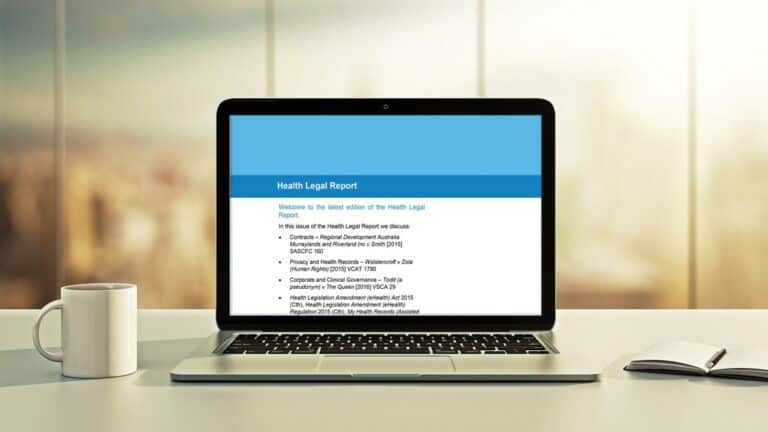Mary Perera by her tutor Marisa Perera v Alpha Westmead Private Hospital trading as Westmead Private Hospital [2022] NSWSC 571
Introduction
In this case, the court considered in detail whether the Plaintiff, Mary Perera (MP), is a person under legal incapacity.
On 27 May 2022, after viewing the relevant evidence, the court found that MP was not a person under legal incapacity.
Facts
MP, in 1995, underwent an atrioventricular canal defect and mitral valve repair surgery in Sri Lanka which was successful. Later in 2001 she and her husband, Ranjan Perera (RP), moved to Australia with their daughter Marisa. MP began working in Australia as a data entry assistant and worked hard in her employment and in raising her family. RP also began working after their arrival as a quality systems co-ordinator. In 2001, they had a second daughter. MP was largely responsible for the childcare and home duties, while RP was responsible for financial matters.
In 2012, MP attended a general practitioner appointment to manage asthmatic symptoms. She was found to have cardiac insufficiency, and surgery was recommended. MP underwent a mitral valve replacement at Westmead Private Hospital (the Defendant) in July 2013. Three days after the surgery MP suffered a cardiac arrest. She was in intensive care for 80 days, undergoing further surgeries and spent a further three months at Mt Wilga Private Rehabilitation Hospital before being discharged home.
In 2017, MP initiated legal proceedings through a tutor, her daughter Marisa Perera, against the defendant. The parties reached a large settlement. MP, by a tutor, then filed a motion in the court to have a declaration that she was not a person under a legal incapacity.
Relevant legislation
The Civil Procedure Act 2005 (NSW) defines a person under legal incapacity as:
any person who is under a legal incapacity in relation to the conduct of legal proceedings (other than an incapacity arising under section 4 of the Felons (Civil Proceedings) Act 1981 (NSW)) and, in particular, includes:
(a) a child under the age of 18 years,
(b) an involuntary patient, a forensic patient or a correctional patient within the meaning of the Mental Health Act 2007 (NSW),
(c) a person under guardianship within the meaning of the Guardianship Act 1987 (NSW),
(d) a protected person within the meaning of the NSW Trustee and Guardian Act 2009 (NSW), and
(e) an incommunicate person, being a person who has such a physical or mental disability that he or she is unable to receive communications, or express his or her will, with respect to his or her property or affairs.
Additionally, the Uniform Civil Procedure Rules 2005 (NSW) defines a person under a legal incapacity under rule 7.13 as “including a person who is incapable of managing his or her affairs.”
The court also considered that section 39 of the NSW Trustee and Guardian Act 2009 (NSW) was indirectly relevant to the matter. This section states that:
It is the duty of everyone exercising functions under this Chapter with respect to protected persons or patients to observe the following principles:
(a) the welfare and interests of such persons should be given paramount consideration,
(b) the freedom of decision and freedom of action of such persons should be restricted as little as possible,
(c) such persons should be encouraged, as far as possible, to live a normal life in the community,
(d) the views of such persons in relation to the exercise of those functions should be taken into consideration,
(e) the importance of preserving the family relationships and the cultural and linguistic environments of such persons should be recognised,
(f) such persons should be encouraged, as far as possible, to be self-reliant in matters relating to their personal, domestic and financial affairs, and
(g) such persons should be protected from neglect, abuse and exploitation.
Issues
The meaning of “legal incapacity”
The court turned to case law precedent to determine the meaning of legal incapacity. In particular, the test applied in Farr v State of Queensland [2009] NSWSC 906, Price J as referenced from Masterman-Lister v Brutton & Co [2003] All ER 162, stating:
The test to be applied, as it seems to me, is whether the party to legal proceedings is capable of understanding, with the assistance of such proper explanation from legal advisers and experts in other disciplines as the case may require, the issues on which his consent or decision is likely to be necessary in the course of those proceedings. If he has capacity to understand that which he needs to understand in order to pursue or defend a claim, I can see no reason why the law – whether substantive or procedural – should require the interposition of a next friend or guardian – ad litem. [Emphasis added]
This was further explored in Nurrish v Schwander [2016] NSWSC 91, which stated “it is necessary to ask whether the relevant party… can deal with the issues in the proceedings with the assistance of appropriate explanation from his or her lawyers and experts retained”.
Is MP a person under legal incapacity?
The court heard expert evidence and evidence from MP’s family regarding her mental state and decision-making capacity. A clinical neuropsychologist’s report prepared in 2020 was submitted and stated that MP was dependent on her husband for large financial matters and was not capable of managing high level finances. A report prepared by her treating neurologist, also in 2020, said that “it would be preferable if she was provided with support when it comes to managing her financial affairs.”
However, legal incapacity is an ever-changing matter, and it was found that, although the matter was initiated by a tutor, it does not, of itself establish incapacity. Furthermore, MP’s treating neurologist provided further detail in 2022, which stated, after speaking to RP, that “she would be able to manage her financial affairs if RP was not available to do so”. RP’s affidavit confirmed that MP “has attended every legal conference and the mediations and many appointments with experts” and MP’s daughter’s affidavit states that “mum has not lost the ability to understand the meaning or importance of something and she has the ability to talk and write”.
Decision
The court found that, keeping in mind the importance of section 39 of the NSW Trustee and Guardian Act 2009 (NSW), MP was not a person under legal incapacity. Although MP had several physical and mental ailments, and it was likely she would require expert financial and accounting advice, there was also a careful and responsible attitude displayed by MP and her family, and the need for financial advice is not uncommon for a settlement amount of this scale. There is a need for the courts to preserve the rights and independence of individuals, and only find a person as a person with legal incapacity when there is a proper basis for concluding that a person is not capable of managing their own financial affairs.
Compliance Impact
Organisations should be aware of the matters that courts will consider when determining someone’s legal incapacity. Importantly, organisations should bear in mind the interests of the person in question and their right for independence, and presume that a person has capacity, unless there is a proper basis for finding otherwise.




